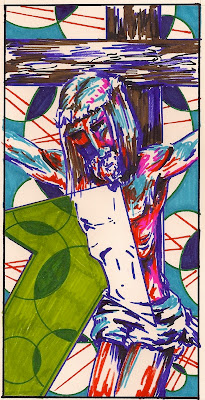2nd Sunday in Lent - John 3:1-17
Lectionary Sketch of the Week
This week's sketch deals mostly with the first portion of the text. While Nicodemus was looking for signs from God, he was still operating from the ordering of the flesh and the world. Jesus tells Nicodemus that in order for him to see the signs of God's Kingdom, he must be born from above (or again) and that it is a birth of water and the spirit. Then he will be able to believe in the sign of all signs (hence the arrow), "as Moses lifted up the serpent in the wilderness, so must the Son of Man be lifted up, that whoever believes in him may have eternal life." As the Israelites looked upon the brazen serpent and lived so those who believe in Jesus will live. The cross is our sign. To the world, this is folly. But to those who have been Baptized, it is the power of God unto salvation. It is where God takes our sin upon himself and conquers death on the third day. It is after this that we can properly interpret arguably the most known Bible verse: "For God so loved the world, that he gave his only Son, that whoever believes in him should not perish but have eternal life."
John 3:1-17
Now there was a man of the Pharisees named Nicodemus, a ruler of the Jews. This man came to Jesus by night and said to him, "Rabbi, we know that you are a teacher come from God, for no one can do these signs that you do unless God is with him." Jesus answered him, "Truly, truly, I say to you, unless one is born again he cannot see the kingdom of God." Nicodemus said to him, "How can a man be born when he is old? Can he enter a second time into his mother's womb and be born?" Jesus answered, "Truly, truly, I say to you, unless one is born of water and the Spirit, he cannot enter the kingdom of God. That which is born of the flesh is flesh, and that which is born of the Spirit is spirit. Do not marvel that I said to you, 'You must be born again.' The wind blows where it wishes, and you hear its sound, but you do not know where it comes from or where it goes. So it is with everyone who is born of the Spirit." Nicodemus said to him, "How can these things be?" Jesus answered him, "Are you the teacher of Israel and yet you do not understand these things? Truly, truly, I say to you, we speak of what we know, and bear witness to what we have seen, but you do not receive our testimony. If I have told you earthly things and you do not believe, how can you believe if I tell you heavenly things? No one has ascended into heaven except he who descended from heaven, the Son of Man. And as Moses lifted up the serpent in the wilderness, so must the Son of Man be lifted up, that whoever believes in him may have eternal life. For God so loved the world, that he gave his only Son, that whoever believes in him should not perish but have eternal life. For God did not send his Son into the world to condemn the world, but in order that the world might be saved through him.
This week's sketch deals mostly with the first portion of the text. While Nicodemus was looking for signs from God, he was still operating from the ordering of the flesh and the world. Jesus tells Nicodemus that in order for him to see the signs of God's Kingdom, he must be born from above (or again) and that it is a birth of water and the spirit. Then he will be able to believe in the sign of all signs (hence the arrow), "as Moses lifted up the serpent in the wilderness, so must the Son of Man be lifted up, that whoever believes in him may have eternal life." As the Israelites looked upon the brazen serpent and lived so those who believe in Jesus will live. The cross is our sign. To the world, this is folly. But to those who have been Baptized, it is the power of God unto salvation. It is where God takes our sin upon himself and conquers death on the third day. It is after this that we can properly interpret arguably the most known Bible verse: "For God so loved the world, that he gave his only Son, that whoever believes in him should not perish but have eternal life."


